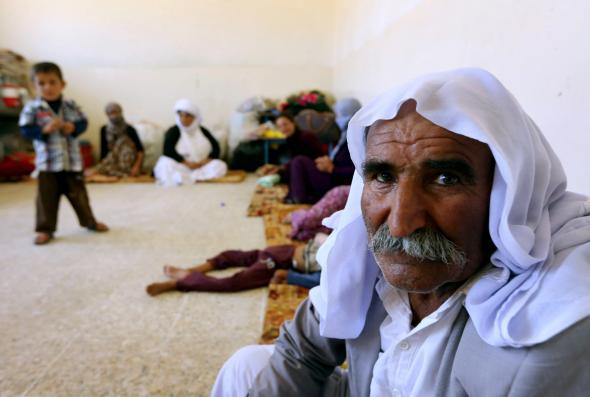Update, 10:55 p.m.: President Obama has authorized airstrikes on ISIS militants in Iraq if needed to protect American personnel.
The Obama administration is reportedly considering a number of actions, including possible airstrikes, in response to the unfolding humanitarian catastrophe in Iraq. Between 10,000 and 40,000 civilians are currently stranded on Mount Sinjar in northern Iraq without food and water, having been driven out of the town of and surrounding villages by ISIS earlier this week. Dehydration is rampant, and dozens have already died.
Most of those stranded are Yazidis, members of a small sect whose religion combines elements of Zoroastrianism and Sufi Islam. They’re considered apostates by ISIS and other groups like it and would likely be killed if they descended from the mountain. The situation facing the Iraqi Yazidis—a group with fewer than 600,000 adherents worldwide, mostly in Iraq, Iran, Turkey and Syria—looks like a potential genocide. George Packer of the New Yorker called it that in a widely read essay yesterday. In a heartrending appeal to the Iraqi parliament this week, a Yazidi lawmaker exclaimed, “Mr. Speaker, We are being slaughtered, we are being exterminated.”
The Yazidis aren’t the only group at risk due to ISIS’ advance. Up to a quarter of the country’s Christians have reportedly fled. Bobby Ghosh of Quartz notes other groups, including the Shabak sect and Iraq’s Turkmen population, that have been targeted. And of course, Shiites have been killed in large numbers in areas taken over by ISIS.
But the immediacy of the crisis facing the trapped Yazidis has caught the world’s attention. In addition to the measure being considered by the White House, which could include humanitarian aid drops as well as airstrikes, the U.N. says it has managed to extract some civilians and is working to get aid to those remaining.
It may seem cynical to point this out, but a specific imminent massacre is more likely to spur international action than ongoing violence, no matter how devastating. Contrast the international community’s response to prevent Muammar Qaddafi’s planned assault in Benghazi in 2011 with the slow-moving reaction to the continuing nightmare in Syria.
The Obama administration has so far been reluctant to use military force in Iraq, hoping for a more inclusive Iraqi government—preferably one without Nouri al-Maliki in charge—to be formed first. Today’s reports may just be a trial balloon from the White House, but if the U.S. does end up ordering airstrikes on behalf of the Iraqi government, it looks like the grim events on Mount Sinjar may be the turning point.
Packer wrote yesterday that there’s “barely any public awareness of the unfolding disaster in northwestern Iraq, let alone a campaign of international support for the Yazidis.” That has changed very quickly. Now, we must wait and see if anything will be done to stop it. And, if something is, what the unintended consequences will be.
